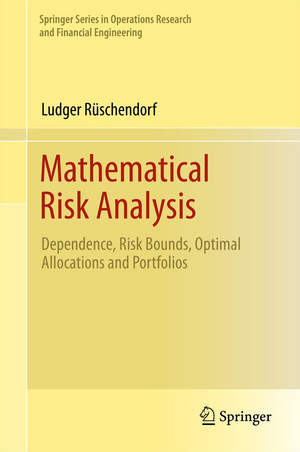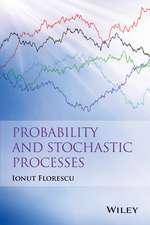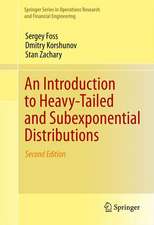Mathematical Risk Analysis: Dependence, Risk Bounds, Optimal Allocations and Portfolios: Springer Series in Operations Research and Financial Engineering
Autor Ludger Rüschendorfen Limba Engleză Hardback – 20 mar 2013
| Toate formatele și edițiile | Preț | Express |
|---|---|---|
| Paperback (1) | 590.16 lei 6-8 săpt. | |
| Springer Berlin, Heidelberg – 12 apr 2015 | 590.16 lei 6-8 săpt. | |
| Hardback (1) | 575.59 lei 38-44 zile | |
| Springer Berlin, Heidelberg – 20 mar 2013 | 575.59 lei 38-44 zile |
Din seria Springer Series in Operations Research and Financial Engineering
-
 Preț: 497.00 lei
Preț: 497.00 lei - 13%
 Preț: 355.75 lei
Preț: 355.75 lei - 15%
 Preț: 365.76 lei
Preț: 365.76 lei - 17%
 Preț: 503.67 lei
Preț: 503.67 lei - 17%
 Preț: 363.08 lei
Preț: 363.08 lei -
 Preț: 347.47 lei
Preț: 347.47 lei - 17%
 Preț: 370.05 lei
Preț: 370.05 lei - 13%
 Preț: 357.53 lei
Preț: 357.53 lei -
 Preț: 356.91 lei
Preț: 356.91 lei - 18%
 Preț: 945.30 lei
Preț: 945.30 lei - 20%
 Preț: 639.28 lei
Preț: 639.28 lei - 23%
 Preț: 732.07 lei
Preț: 732.07 lei -
 Preț: 384.48 lei
Preț: 384.48 lei - 15%
 Preț: 638.43 lei
Preț: 638.43 lei - 18%
 Preț: 740.57 lei
Preț: 740.57 lei - 18%
 Preț: 1395.63 lei
Preț: 1395.63 lei -
 Preț: 407.98 lei
Preț: 407.98 lei -
 Preț: 358.39 lei
Preț: 358.39 lei - 20%
 Preț: 549.58 lei
Preț: 549.58 lei - 18%
 Preț: 737.43 lei
Preț: 737.43 lei - 15%
 Preț: 660.37 lei
Preț: 660.37 lei -
 Preț: 411.67 lei
Preț: 411.67 lei -
 Preț: 405.06 lei
Preț: 405.06 lei -
 Preț: 391.02 lei
Preț: 391.02 lei - 18%
 Preț: 898.13 lei
Preț: 898.13 lei -
 Preț: 495.84 lei
Preț: 495.84 lei - 19%
 Preț: 526.97 lei
Preț: 526.97 lei -
 Preț: 391.02 lei
Preț: 391.02 lei -
 Preț: 392.97 lei
Preț: 392.97 lei - 15%
 Preț: 538.61 lei
Preț: 538.61 lei - 15%
 Preț: 880.15 lei
Preț: 880.15 lei - 24%
 Preț: 831.85 lei
Preț: 831.85 lei - 18%
 Preț: 837.15 lei
Preț: 837.15 lei - 18%
 Preț: 801.65 lei
Preț: 801.65 lei - 15%
 Preț: 637.28 lei
Preț: 637.28 lei - 19%
 Preț: 529.48 lei
Preț: 529.48 lei -
 Preț: 391.42 lei
Preț: 391.42 lei
Preț: 575.59 lei
Preț vechi: 710.61 lei
-19% Nou
Puncte Express: 863
Preț estimativ în valută:
110.17€ • 119.71$ • 92.61£
110.17€ • 119.71$ • 92.61£
Carte tipărită la comandă
Livrare economică 17-23 aprilie
Preluare comenzi: 021 569.72.76
Specificații
ISBN-13: 9783642335891
ISBN-10: 3642335896
Pagini: 422
Ilustrații: XII, 408 p.
Dimensiuni: 155 x 235 x 32 mm
Greutate: 0.77 kg
Ediția:2013
Editura: Springer Berlin, Heidelberg
Colecția Springer
Seria Springer Series in Operations Research and Financial Engineering
Locul publicării:Berlin, Heidelberg, Germany
ISBN-10: 3642335896
Pagini: 422
Ilustrații: XII, 408 p.
Dimensiuni: 155 x 235 x 32 mm
Greutate: 0.77 kg
Ediția:2013
Editura: Springer Berlin, Heidelberg
Colecția Springer
Seria Springer Series in Operations Research and Financial Engineering
Locul publicării:Berlin, Heidelberg, Germany
Public țintă
Professional/practitionerCuprins
Preface.-Part I: Stochastic Dependence and Extremal Risk.-1 Copulas, Sklar's Theorem, and Distributional Transform.- 2 Fréchet Classes, Risk Bounds, and Duality Theory.- 3 Convex Order, Excess of Loss, and Comonotonicity.- 4 Bounds for the Distribution Function and Value at Risk of the Joint Portfolio.- 5 Restrictions on the Dependence Structure.- 6 Dependence Orderings of Risk Vectors and Portfolios.- Part II: Risk Measures and Worst Case Portfolios.- 7 Risk Measures for Real Risks.- 8 Risk Measures for Portfolio Vectors.- 9 Law Invariant Convex Risk Measures on L_d^p and Optimal Mass Transportation.- Part III: Optimal Risk Allocation.- 10 Optimal Allocations and Pareto Equilibrium.- 11 Characterization and Examples of Optimal Risk Allocations for Convex Risk Functionals.- 12 Optimal Contingent Claims and (Re)Insurance Contracts.- Part IV: Optimal Portfolios and Extreme Risks.- 13 Optimal Portfolio Diversification w.r.t. Extreme Risks.- 14 Ordering of Multivariate Risk Models with Respect to Extreme Portfolio Losses.- References.- List of Symbols.- Index.
Recenzii
From the reviews:
“The book contains four parts: stochastic dependence and extremal risk, risk measures and worst case portfolios, optimal risk allocation, and optimal portfolios and extreme risk. … the book will be definitely interesting to researchers and graduate students in the areas of insurance, financial mathematics, risk management, etc., as it gives a clear picture which research directions have been pursued and to what extent.” (Jonas Šiaulys, zbMATH, Vol. 1266, 2013)
“The book contains four parts: stochastic dependence and extremal risk, risk measures and worst case portfolios, optimal risk allocation, and optimal portfolios and extreme risk. … the book will be definitely interesting to researchers and graduate students in the areas of insurance, financial mathematics, risk management, etc., as it gives a clear picture which research directions have been pursued and to what extent.” (Jonas Šiaulys, zbMATH, Vol. 1266, 2013)
Notă biografică
Ludger Rüschendorf, Professor of Mathematical Stochastics, studied Mathematics, Physics and Economics in Münster. Diploma thesis 1972 - PhD 1974 in Hamburg in Asymptotic Statistics - Habilitation thesis 1979 in Aachen in the area of stochastic ordering, masstransportation and Fréchet bounds - Professorships in Germany: 1981-1987 in Freiburg, 1987-1993 in Münster, 1993- in Freiburg. He is elected member of the ISI, and author and co-author of several books and about 180 research papers.
Textul de pe ultima copertă
The author's particular interest in the area of risk measures is to combine this theory with the analysis of dependence properties. The present volume gives an introduction of basic concepts and methods in mathematical risk analysis, in particular of those parts of risk theory that are of special relevance to finance and insurance. Describing the influence of dependence in multivariate stochastic models on risk vectors is the main focus of the text that presents main ideas and methods as well as their relevance to practical applications. The first part introduces basic probabilistic tools and methods of distributional analysis, and describes their use to the modeling of dependence and to the derivation of risk bounds in these models. In the second, part risk measures with a particular focus on those in the financial and insurance context are presented. The final parts are then devoted to applications relevant to optimal risk allocation, optimal portfolio problems as well as to the optimization of insurance contracts.
Good knowledge of basic probability and statistics as well as of basic general mathematics is a prerequisite for comfortably reading and working with the present volume, which is intended for graduate students, practitioners and researchers and can serve as a reference resource for the main concepts and techniques.
Good knowledge of basic probability and statistics as well as of basic general mathematics is a prerequisite for comfortably reading and working with the present volume, which is intended for graduate students, practitioners and researchers and can serve as a reference resource for the main concepts and techniques.
Caracteristici
Up-to-date treatment of the main concepts and techniques used in mathematical risk analysis Clearly structured guide Gives orientation and help to acquire a solid fundament for working in this area? Includes supplementary material: sn.pub/extras














